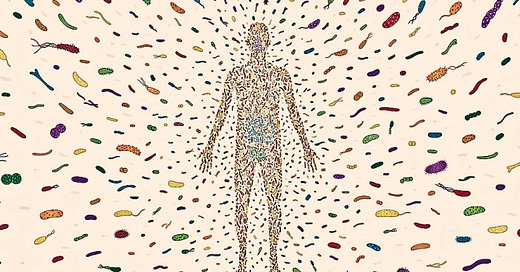Subscribe to the STEMScribe newsletter to gain full access to our materials. It’s free!
If you would like to submit a guest post to the blog, please fill out this form.
The human body is home to trillions of microscopic organisms, collectively known as the microbiome. This complex ecosystem of bacteria, viruses, and fungi plays a crucial role in human health and has become a focal point of modern medical research.
The microbiome is a diverse community of microorganisms that inhabit various parts of the human body, including the gut, skin, and respiratory tract. Microbial cells in the human body outnumber human cells by approximately 10 to 1. Each person's microbiome is distinct, influenced by factors such as diet, environment, and genetics. The gut microbiome communicates with the brain through the gut-brain axis, potentially influencing mood and behavior. A healthy microbiome aids in training and supporting the immune system. Certain gut bacteria produce essential vitamins and assist in digesting complex carbohydrates.
Research has linked the microbiome to various aspects of human health. Imbalances in gut bacteria have been associated with conditions like irritable bowel syndrome (IBS) and inflammatory bowel disease (IBD). Numerous studies suggest a potential link between the microbiome and conditions such as depression and anxiety. Gut bacteria composition may influence how the body processes food and stores fat. Early exposure to diverse microbes might play a role in preventing allergies and asthma. Ongoing research is exploring connections between certain gut bacteria and cancer risk.
Several strategies can support a balanced microbiome. Consuming a variety of fruits, vegetables, and whole grains promotes microbial diversity. Probiotic and prebiotic supplements can support beneficial gut bacteria. While sometimes necessary, antibiotics can disrupt the microbiome, so judicious use is recommended. Interaction with nature can introduce beneficial microbes to the body.
The field of microbiome research is rapidly evolving. Current areas of exploration include personalized probiotic treatments, microbiome-based therapies for various diseases, and using microbiome analysis for health prediction and prevention.
The human microbiome represents a frontier in medical research. As understanding of this complex ecosystem grows, it may revolutionize approaches to health and disease. Continued research in this field holds promise for innovative treatments and preventive strategies in healthcare.
Written by Rupsa Mitra
The STEMScribe blog is a reader-supported publication. Subscribe to show your support. It’s free!
Consider spreading the word:



